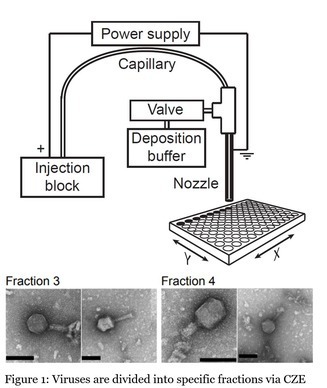Isolation of Viruses using Capillary Zone Electrophoresis
Tech ID: 20-009
Inventor: Dr. Matthew Champion, Dr. Bonnie Huge, Dr. Norman Dovichi
Date Added: September 30, 2020

Overview
A new process for effectively sorting viruses, including phages, to improve detection and identification.
Technology Summary
Whether detecting viruses from a river, a biological sample, a food source, etc. one of the greatest challenges we face is the ability to effectively identify rare needle-in-a-haystack viruses, leading to false negatives, inaccurate data reporting, and uncertainty about our safety. This occurs primarily because of the vast diversity of genetic material in a given sample due to the overwhelming amount of other viruses in that sample.
Scientists at the University of Notre Dame have developed a method to sort different species of viruses in a given sample in order to reduce noise and dramatically improve the ability to identify infrequent viruses during downstream techniques such as PCR. Using capillary zone electrophoresis and fractionation (Fig 1) viruses are sorted via their charge-size ratio and placed into separate chambers on a sampling tray, making it easy for the user to begin processing.
Market Advantages
- Separates and fractionates rare and closely related bacteriophages with a 3 times better sensitivity than current solutions
- High efficiency and speed can be achieved by combining with an automated fraction collection system to separate mixed phage populations prior to conventional genomic sequencing analysis
- Cost-saving due to reduced labor hours to manually isolate phages
Applications
- Discovery of new viruses for genetic transduction & engineering
- Discovery of new phages for food preservatives & antimicrobial
- Phage banks & phage therapy
- Detection of harmful viruses
Technology Readiness Level
TRL 4 - Small scale prototype in laboratory environment
Intellectual Property Status
US Patent 2018 / 0258461
Contact
Richard Cox
rcox4@nd.edu
574.631.5158